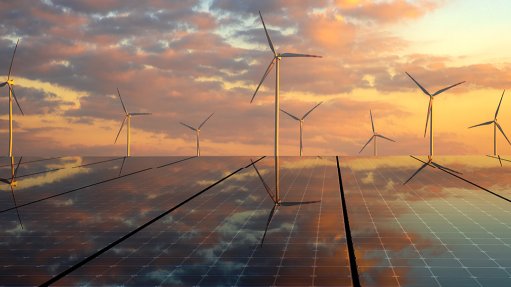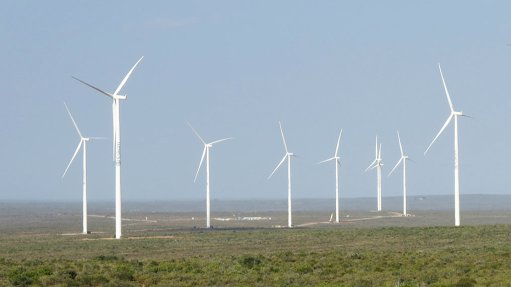On-The-Air (02/07/2021)
Every Friday, SAfm’s radio anchor Sakina Kamwendo speaks to Martin Creamer, publishing editor of Engineering News & Mining Weekly. Reported here is this Friday’s At the Coalface transcript:
Kamwendo: Waste cooking oil has been successfully used to power a cargo ship from Singapore to South Africa.
Creamer: Innovation is in the air. People want to decarbonise and Anglo American must be credited for persuading the Singaporeans to experiment with their large stock of cooking oil from their food and beverage industry. The waste cooking oil actually powered the ship that they used to transport some of their commodities from Singapore to South Africa. This was an experiment.
A lot of these big companies want to lower the carbon emission from ships, which is quite substantial. The oil that is used by ships now is high-carbon. They want to use other methods of doing this and to stumble upon cooking oil was quite an innovation. To find that it was actually successful and to modify it to a biofuel is going to be important in the new world of low-carbon. The world is demanding this. The mining companies have been told you have got to lower your emissions, Scope one two and three emissions. They have got to bring these down.
A lot of them are targeting that for 2030 and 2040. By 2050 it is going to be an absolute must. Of course, they want to do that well before. This is an example. Our iron-ore could now be transported around the world in ships that use waste cooking oil as the main fuel ingredient.
Kamwendo: Rare earths worth close to R70-billion have been found in an old discarded mine dump in Limpopo.
Creamer: In Phalaborwa, people have been walking past this gypsum dump for probably half a century. It is there and we have a lot of these around. Then a British-listed company, listed on the AIM in London, Rainbow Rare Earths, decided to have a closer look at the dump material and saw huge potential. They started sampling and discovered that it contains just what the world needs – rare earths. These rare earths are in huge demand. Again, from a world that is going to electrify in clean ways and use magnets particularly. It needs rare earths.
What they discovered there is that the value in the dump is close to R70-billion. They can get the rare earths out in less than two years. This is the sort of opportunity, the low-hanging fruit, that South Africans have to go for. We know that the same thing has happened in the Northern Cape. Jan Nelson walked passed another dump that had been there for half a century, and again, people thought it had no value, but Jan discovered that there is a lot of copper in it. So much copper that, at a time of high copper price, even though they have invested in a concentrator plant and put a lot of money into the project, they will make their money back in the second month. Month two, and they will have got all their investment back.
This is the sort of low-hanging fruit we have got to go for in South Africa. We know of all those gold mine dumps between Soweto and Johannesburg, the gold must be recovered from them and they must be removed, because in removing them, you are not only able to recover huge value, but also allow the people to live closer to their places of work; they won’t have to spend their lives in taxis. They can live closer to the city, because with the dumps removed, near-city ground is freed up for redevelopment. So, there’s a lot of opportunity in dumps and we need to go for it.
Kamwendo: A company run by black women is building 15 new hydrogen projects around the country.
Creamer: Yes, Zanele Mbatha, she needs to take a bow. We used to talk to Zanele about 15 years ago when she was involved with Lonmin Platinum. We know that Lonmin went through a lot of struggles. She was the partner there with Incwala Resources. Lonmin eventually became Sibanye and she, during that period with Lonmin, had realised the advantage of beneficiating platinum group metals.
She became fascinated with fuel cells with hydrogen. Now, she has gone headlong into this with huge determination. She has already put in the first hydrogen fuel cell system at the One Military Hospital, in Pretoria. She has got 15 other projects on the go and she has got people speaking to her from all over the world. She has got a lot of enquiries coming in and she is working in partnership with Singapore, Sweden, Germany and US. She is working with four government departments, Science and Innovation, Defence, Public Works and Mineral Resources. Also, in the Hydrogen Valley, she has linked up with Anglo American and all the big partnerships. She believes in big partnerships, but she also believes in local manufacture.
She is looking at the membrane electrode assemblies being made here, as well as components being made here. She is talking about a 30% local content initially, but an 80% local content eventually. She envisages setting up at the Dube Trade Port, in Kwa-Zulu Natal, and beginning to employ people for that in the last quarter of this year. In the meantime, she is working on these 15 demonstration projects to get them up before the end of the first quarter of next year.
Kamwendo: Thanks very much. Martin Creamer is publishing editor of Engineering News & Mining Weekly.
Article Enquiry
Email Article
Save Article
Feedback
To advertise email advertising@creamermedia.co.za or click here
Announcements
What's On
Subscribe to improve your user experience...
Option 1 (equivalent of R125 a month):
Receive a weekly copy of Creamer Media's Engineering News & Mining Weekly magazine
(print copy for those in South Africa and e-magazine for those outside of South Africa)
Receive daily email newsletters
Access to full search results
Access archive of magazine back copies
Access to Projects in Progress
Access to ONE Research Report of your choice in PDF format
Option 2 (equivalent of R375 a month):
All benefits from Option 1
PLUS
Access to Creamer Media's Research Channel Africa for ALL Research Reports, in PDF format, on various industrial and mining sectors
including Electricity; Water; Energy Transition; Hydrogen; Roads, Rail and Ports; Coal; Gold; Platinum; Battery Metals; etc.
Already a subscriber?
Forgotten your password?
Receive weekly copy of Creamer Media's Engineering News & Mining Weekly magazine (print copy for those in South Africa and e-magazine for those outside of South Africa)
➕
Recieve daily email newsletters
➕
Access to full search results
➕
Access archive of magazine back copies
➕
Access to Projects in Progress
➕
Access to ONE Research Report of your choice in PDF format
RESEARCH CHANNEL AFRICA
R4500 (equivalent of R375 a month)
SUBSCRIBEAll benefits from Option 1
➕
Access to Creamer Media's Research Channel Africa for ALL Research Reports on various industrial and mining sectors, in PDF format, including on:
Electricity
➕
Water
➕
Energy Transition
➕
Hydrogen
➕
Roads, Rail and Ports
➕
Coal
➕
Gold
➕
Platinum
➕
Battery Metals
➕
etc.
Receive all benefits from Option 1 or Option 2 delivered to numerous people at your company
➕
Multiple User names and Passwords for simultaneous log-ins
➕
Intranet integration access to all in your organisation



















